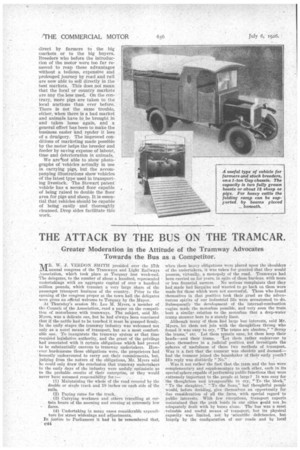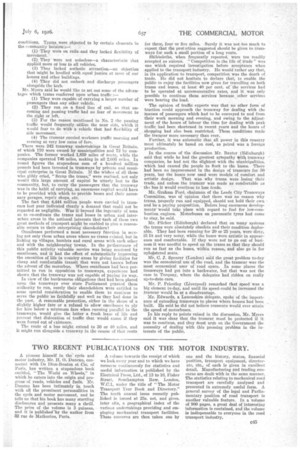THE ATTACK BY THE BUS ON THE TRAMCAR.
Page 34

Page 35

If you've noticed an error in this article please click here to report it so we can fix it.
Greater Moderation in the Attitude of the Tramway Advocates Towards the Bus as a Competitor.
B. W. J. 'VERDUN SMITH presided over the '17th
annual congress of the Tramways and Light Railways Association, which took place at Torquay last week-end. The delegates, to the number of about a hundred, represented undertakings with an aggregate capital of over a hundred million pounds; which transact a very large share of the passenger transport business of the country. Prior to the opening of the congress proper at the town hall the delegates were given' an official welcome to Torquay by the Mayor.
..At Thursday's session Mr. Leo M. Myers, a member of the Council of the Association, read a paper on the competition of motorbuses with tramways. The subject, said Mr. Myers, was a delicate one, but he had always been convinced that if the nettle had to be touched it must be grasped firmly. In the early stages the tramway industry was welcomed not only as a novel means of transport, but as a most comfortable one To inaugurate the tramway system at that time required legislative authority, and the grant of the privilege had associated with it certain obligations which had proved to be substantially onerous to tramway undertakers. How-'
• ever burdensome those obligations were, the proprietors had honestly endeavoured to carry out their commitments, but, judging from the nature of the obligations, Mr. Myers said he could only draw the conclusion that tramway undertakers in the early days of the industry were unduly optimistic as to the probable. results of their enterprise, or they would never have assumed responsibility for (1) Maintaining the whole of the road covered by the double or single track and 18 inches on each side of the rails. • (2) Paying rates for the track.
(3) Carrying workmen and others travelling at certain hours of the morning and evening at extremely low fares.
(4) Undertaking in many eases considerable expenditure for street widening; and adjustments.
In justice to Parliament it had to be remembered that, ." 044
when these heavy obligations were placed upon the 'shoulders of the undertakers, it was taken for granted that they would possess, virtually, a monopoly of the road. Tramways had been carried on for years, in spite of these burdens, with more or less financial success. No serious complaints that they had made bad bargains and wanted to go back on them were made for those which were not successful. Those who found themselves in that position took their gruel asthe adventurous spirits of our industrial life were accustomed. to do. Subsequently the development of the internal-combustion engine made the motorbus possible, and very soon the tram bon a similar. relation to the motorbus that a deep-water tramp steamer bore to a stately liner.
Although many of ,them had large bus interests, said Mr. Myers, let them not join with the thoughtless throng who found it was easy to cry, " The trams are obsolete," " Scrap the trams," etc. Let them rcmain sane, let them keep their heads—and their trams. 'Let them rather endeavour to place themselves in a judieiar position and investigate the spheres of usefulness of these two methods of transport. Was it a fact that the tramcar was obsolete and doomed— bad the tramcar joined the boneshaker of their early youth? His reply was distinctly " No."
Was it not rather the fact thatthe tram and the bus were complementary and supplementary to each other, each in its special sphere capable of performing public functions that were extremely imPortant to the people at large? It was easy for the thoughtless and. irresponsible to cry, "To the block," "To the slaughter," "To the lions," but thoughtful people would, before deciding, give themselves an 'opportunity for due consideration of all the facts, with special regard to public interests. With few exceptions, transport experts maintained that the peak loads in our cities qould not be adequately dealt with by buses alone. The bus was a most valuable and useful means of transport, but its physical capacity was limited, not by -scientific deficiencies, but largels by the configuration of ourroads and by local conditions. Trams were. objected to by certain elements in the itomraunity beeause.:—.
(1) They were on rails. and they lacked flexibility of
movement. '
. (2) They were not noiseless—a characteristic that applied more or less to all vehicles.
(3) They lacked testhetic attraction.—an objection that might be levelled with equal justice at most of our houses and other buildings.
(4) They did not embark and discharge passengers alongside the kerb.
Mr. Myers Said he would like to set out some of the advantages which trains confetrecl upon urban traffic : (1) They were capable of carrying a larger number of passengers than any other vehicle.
(2) They ran on ft fixed line of rail, so that oncoming and passing traffic had no fear of movement to
the right or left. • , (3) For the reason mentioned in No. 2 the passing traffic would frequently utilize the near side, which it would fear to do with a vehicle that had flexibility of side movement.
(4) The tramcar carried .workmen traffic morning and evening at very low rates of fare.
There were 242 tramway undertakings in Great Britain, of which 170 were owned by municipalities and 72 by companies. The former worked 1,859 miles of route, while the companies operated 746 miles, making in all 2,005 miles. In round figures the stupendous sum of a hundred million pounds had been invested in tramways by private and municipal enterprise in Great Britain. If the wishes of all these who glibly cried, "Scrap the trams," were realized, not only would this large amount of capital be utterly lost to the community, but, to carry the passengers that the tramway was in the habit of carrying, an enormous capital would have to be provided with which to provide buses and their necessary garages, repair shops, etc.
The fact that 4,444 million people were carried in tramcars last year indicated clearly a demand that could not be regarded as negligible. Was it beyond the ingenuity of man so to co-ordinate the trams and buses in urban and interurban .areas in the national interests that 'each of these two great methods of transport might be enabled to give a reasonable return to their enterprising shareholders?
Omnibuses performed a most necessary femetion in serving not only those urban areas where no trams existed, but in linking up villages, hamlets and rural areas with each other and with the neighbouring towns. • In the performance of this public activity valuable service was being rendered by omnibuses, and it had the effect of substantially improving the amenities of life in country areas by giving facilities for cheap and comfortable transit that were not known before the advent of the motorbus. Where omnibuses had been permitted to run in opposition to tramways, experience had shown that the tramway was not capable of paying its way. In view of the burdensome obligations that had been placed upon the tramways ever since Parliament granted theni authority to run, surely their shareholders were entitled to some special consideration to enable them to continue to serve the public 'as faithfully and well as they had done in the past. A. reasonable protection, either in the shape of a slightly higher fake or a refusal to allow omnibuses to ply for hire below a minimum fare when running parallel to the tramways, would give the latter a fresh lease of life and prevent that dislocation of traffic that would ensue if they were forced out of existence.
The route of a bus might extend to 30 or 40 miles, and it might run alongside a tramway in the course of that route for three, four or five miles. Surely it was not too much to expect that the protsction suggested should be given to tramways for such a small portion of a long route.
Shibboleths, when frequently repeated, were too readily accepted as axioms. "Competition is-the life of trade" was one which required investigation before acceptance when applied to the transport industry. He would rather say that, in its application to transport, competition was the death of trade. He did not hesitate to declare that, to enable the public to enjoy the facilities now given for travelling on both trams and buses, at least 40 per cent. of the services had to be operated at unrernunerative rates, and it was only possible to continue these services because other services were bearing the load. •
The opinion of traffic experts was that DO other form of traction could approach the tramway for dealing with the masses of passengers which had to he conveyed to and from their work morning and evening, and awing to the adjustment of the hours of labour the time for dealing with peak traffic had been shortened in recent years and the hours of shopping had also been restricted. These conditions made the tramcar more necessary than ever.
Further, it was axiomatic that all power in this country must ultimately be based on coal, as petrol was a foreign production.
In the course of the discussion Mr. Baxter (Edinburgh) said that while he had the greatest sympathy with tramway companies, he had not the slightest with the Municipalities, which had caused the people to flock to the buses. There had been no improvement in the design of tramcars for 50 years, but the buses now used were models of comfort and
artistic design. That was why trams were losing their trade, and unless the tramcar was made as comfortable as the bus it would continue to lose trade.
Mr. Graham Ford, chairman of the Leeds City Tramways Committee, was of opinion that there was no reason why trains, properly run and equipped, should not hold their own and be a paying proposition. Before long enormous developments would take place with regard to fuel for low-combustion engines. Motorbuses on pneumatic tyres had come to stay, he said.
Mr. Filcher (Edinburgh) declared that on. many systems the trams were absolutely obsolete and their condition deplorable. They had been running for 20 or 25 years, were dirty, ill lit and very noisy, while the buses were artistic in appearance and comfortable. If they were not to go out of business it was needful to speed up the trams so that they should run as fast as the buses, within reason, and also go in for upholstered seats.
Mr. C. J. Spencer (London) said the great problem to-day was the economical use of the road, and the tramcar was the most economical user of road space. In some places the tramways had got into a backwater, but that was not the case in Torquay, where the delegates had ridden on really up-to-datecars.
Mr. P. Priestley (Liverpool) remarked that speed was a big element to-day, and until its speed,could be increased the tramcar would be at a disadvantage.
Mr. Edwards, a Lancashire delegate, spoke of the importance of extending tramways to places where houses had been built. He said he did not believe tramcars would ever attain the speed of motorbuses.
In his reply to points raised in the discussion, Mr. Myers said it was clear that the tramcar. must be protected if it was to continue, and they Must urge on the Government the necessity of dealing with this pressing problem in the interests of the public.
















































